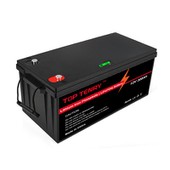25.6V 8000mAh Medical Battery for Electric Bed


|
Model No. |
TRYL-25.6V-8AH |
|
Category |
25.6V-8AH |
|
Mounting |
26650-8S2P |
|
Capacity |
8Ah |
|
Standard discharge current |
0.2C |
|
Max. continuous current |
2C |
|
Working voltage range |
16V~29.2V |
|
Nominal voltage per cell |
25.6V |
|
Max charge current |
1C |
|
Max charge voltage |
29.2V |
|
Self-discharging rate |
<1% (25±2°C, 50% SOC for 3 months' storage) |
|
Working humidity |
45~85% |
|
Working temperature |
-20°C~60°C |
|
Net Weight |
1.557kg |
|
Dimension |
213*71.5*67mm |
|
Casing material |
* |
|
Standard cycles |
≥800 (@0.5C, 80% DOD, 25℃) |
|
Available working altitude |
<2000M |
|
Cooling-off way |
Natural cooling |
|
Protection |
||||||
|
|
|
|
|
|
|
|
|
Low voltage |
Over voltage |
Over current |
Over temperature |
Balanced |
Over discharge |
Short circuit |
|
Protection |
Protection |
Protection |
Protection |
Protection |
Protection |
Protection |
Why choose Tenry 25.6v 8000mAh Battery
1. High reliability: Medical equipment has high requirements on the reliability of power supply, because their normal operation is directly related to the health and life of patients. Medical batteries must have highly stable voltage output and long service life to ensure that medical equipment does not experience power interruption or failure at critical moments.
2. High energy density: Medical devices usually need to be used for a long time and require the battery size to be as small as possible so that it can be easily carried or implanted by patients. Therefore, medical batteries need to have high energy density, that is, they can store more energy per unit volume or unit weight.
3. Safety: Medical batteries must meet strict safety standards to prevent accidents such as leakage, short circuit, or overheating. This is because the medical device may be used inside the patient's body, so the battery needs to have good durability and safety properties to avoid any unnecessary harm to the patient.
4. Compatibility: Different types of medical equipment may use different types of batteries, so medical batteries need to have strong compatibility to adapt to the requirements of various medical equipment. Common medical battery types include lithium-ion batteries, nickel-metal hydride batteries, and silver-zinc oxide batteries.
5. Special environmental adaptability: Medical batteries may need to work in special environments, such as high temperature, low temperature, high humidity or high altitude. Battery performance and reliability need to be guaranteed in these extreme environments to ensure the normal operation of medical equipment.
6. Regulations and compliance requirements: The manufacturing of medical batteries must comply with relevant regulations and compliance requirements. These requirements may involve battery material selection, production processes, safety certification, etc. to ensure the quality and reliability of medical batteries and comply with the standards and specifications of the medical device industry.
7. Cost and Sustainability: The cost and sustainability of medical batteries are also considerations in the manufacturing process. The high performance and special requirements of medical batteries may lead to increased manufacturing costs, and the market for medical devices is highly competitive, so manufacturers need to reduce costs as much as possible while ensuring quality and performance, and consider the sustainability and environmental impact of batteries. .
8. Charging and charging management: Some medical devices use rechargeable batteries, so appropriate charging solutions and charging management systems need to be designed. This includes developing chargers that meet medical device requirements, ensuring batteries can be charged under safe and efficient charging conditions.
9. Size and shape adaptability: Medical batteries usually need to match the design requirements of medical equipment, and size and shape adaptability are very important. The shape, size, and connection of the battery must be compatible with the device's power interface and accommodate the device's form and structural constraints.
10. Supply chain management: The manufacturing of medical batteries requires supply chain management to ensure that the entire process from raw material procurement to production and delivery operates efficiently. This includes cooperation with suppliers, raw material quality control, supervision of the production process and quality management to ensure battery reliability and stability.
11. Standardization and certification: Medical batteries need to comply with relevant standards and certification requirements, such as ISO standards and medical device-related certifications. These standards and certifications ensure that the quality, performance and safety of batteries comply with international and industry norms, helping to improve market competitiveness and consumer trust.
12. Medical electronic bed: For batteries used in medical devices, the power requirements of the patient also need to be considered. Battery power selection and design must be able to match the daily use of the electronic bed and reduce repetitive operation for the patient.
Main Application
Our lithium ion batteries can be mainly used on below products:
Electric Wheelchair
Medical Vehicle
Medical X-ray Equipment
Surgical Equipment
Electric Medical Bed
Respirator

Hot Tags: 25.6v 8000mah medical battery for electric bed, China 25.6v 8000mah medical battery for electric bed manufacturers, suppliers, factory
















